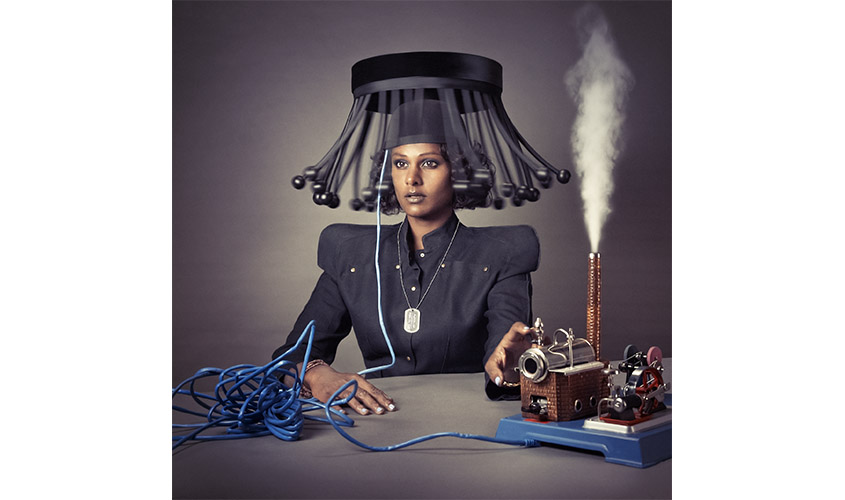Sasha Perera is a singer, producer, songwriter and DJ, whose music has a “shape-shifting” nature. The talented musician, who goes by the stage name Perera Elsewhere, is known for blending traditional sounds from around the globe with electronic and psychedelic instrumentals. That’s what the second part of her name derives from. “Elsewhere” is a sonic landscape where unlikely sound combinations can co-exist.
London-born and Berlin-based Perera was recently in India to conduct “Inspiration Tours” across cities like Delhi, Mumbai and Bangalore. She held workshops for women who are interested in music production and DJing as part of Wild City’s initiative “Women in Electronic Music”. The interactive workshops were followed by Perera’s live performances.
Perera’s passion for music goes back to her childhood. She told us that her mother used to listen to lots of music and played the harmonium. Inspired by her, Perera too started playing instruments like the piano and trumpet. She pointed out that her interest in music developed also because of London, the city she grew up in. “Being a consumer of music, and growing up in London meant that there were a lot of hybrid scenes of music coming to life all the time. But I never wanted to just be a consumer of music. I wanted to participate in the scene and shape what was happening around me,” she said.
Her career as a musician started with the Berlin band Jahcoozi and they released four albums together. But Perera wanted to make her own music. A few years after joining the band, she started recording as a solo artist under the name Perera Elsewhere. She said, “It [her solo music] was more like a thing I did on the side to escape the club sounds of Jahcoozi. I didn’t even have a name for the project.”
She debuted with a solo album, Everlast, in 2013. She admits that she didn’t like the beats she made for her first album, which to her sounded like “almost ambient experimental guitar loop songs”. She feels she has grown a lot as a producer since then. In 2017, she released her second album, All of This, which received much acclaim for its gritty soundscapes. Last year, Perera’s new EP, Drive, came out. This was also founded on trip-hop and other eerie rhythms.
When asked about her influences in music, Perera said, “I am a geek and have always been hungry for new music. So, it’s a massive list. But to name a few, Warp Records—I started being interested in the label when I was a kid. It kind of shaped my musical wideness. Then there is Massive Attack, Portishead, Jungle, Rhythm & Sound, Underground Resistance, Mazzy Star, Micachu, Aphex Twin etc.”
Perera does not limit herself to live gigs and albums. Last year, she composed music for a Red Cross advertisement in Switzerland, and for an ocean conservation documentary. She also teaches aspiring musicians. “I love the fact that one week I play live on a big stage and the week after I DJ in a grimy sweaty club. I also feel blessed to have been involved in so many collaborations and projects in Africa and Asia. Teaching people Ableton [a digital audio software] in places like India, Burkina Faso and Ivory Coast is also so enjoyable,” she said.
Talking about the workshops she conducted in India, Perera said that she was happily surprised to see women participating from fairly diverse age groups—from 20 to 40 years. Some of the participants already had some experience of playing and performing music, while others were in bands, were DJing or had Indian classical music credentials. Perera said, “It was a really nice mix. They all seemed very open, genre-wise. It was inspiring to see. Everyone seemed very computer-literate, which made teaching them how to use an audio programme much easier.”
She hopes that more women in music help build a support system for each other. “They should provide a community for each other. I also hope that this will trickle down to ladies who are less computer literate. These women should also seek to empower women who are less fortunate with production skills. Just by being visible in the scene, the ladies are acting as role models,” she said.
But the number of women opting for electronic music still remains low in India. Perera thinks that the reason for this is lack of awareness. She urges established artists to reach out and hold workshops, create learning or sharing spaces to pool knowledge and share equipment. According to her, arranging little gatherings for women where they can play their productions and ask for feedback is important to persuade more women to take up electronic music.
She pointed out that she is glad that cheap musical gear is available now so that people can make music at home. And so, she expects the electronic music industry to grow in the future. She signed off by telling us that she is currently working on the production of her upcoming six-track EP.

